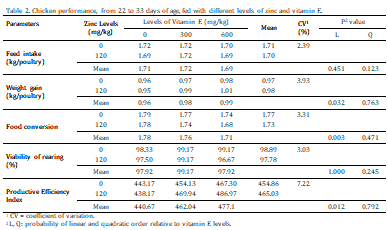Organic zinc and vitamin E supplementation for broiler chickens under natural heat stress conditions
DOI:
https://doi.org/10.21708/avb.2020.14.4.5151Resumo
The objective was to evaluate the supplementation of organic zinc and vitamin E, isolated or in association, in the diet of broiler chickens from 22 to 42 days of age, under natural conditions of heat stress, on the productive performance, carcass, noble cuts, and abdominal fat yield. A group of 720 birds was housed at 22 days of age, distributed in random blocks with a 2x3 factorial design, with two levels of zinc in the organic form (0.0 mg/kg and 120 mg/kg), associated with three levels of vitamin E in the form of DL-α-tocopherol acetate (0.0 mg/kg; 300 mg/kg, and 600 mg/kg), with six replicates, and 20 birds per box. In natural conditions of heat stress, the association of organic zinc and vitamin E in the diet of broilers from 22 to 42 days of age did not affect the productive performance, carcass, noble cuts, and abdominal fat yield. In an isolated way, the supplementation of vitamin E improved the productive performance in from 22 to 33 days of age. Moreover, in the period of 22 to 42 days of age, the level of 312.5 mg/kg of vitamin E provided better creative viability.
Downloads

Downloads
Publicado
Edição
Seção
Licença
Autores que publicam na Acta Veterinaria Brasilica concordam com os seguintes termos: a) Autores mantém os direitos autorais e concedem à revista o direito de primeira publicação, com o trabalho simultaneamente licenciado sob a Licença Creative Commons Attribution que permite o compartilhamento do trabalho com reconhecimento da autoria e publicação inicial nesta revista. b) Autores têm autorização para assumir contratos adicionais separadamente, para distribuição não-exclusiva da versão do trabalho publicada nesta revista (ex.: publicar em repositório institucional ou como capítulo de livro), com reconhecimento de autoria e publicação inicial nesta revista. c) Autores têm permissão e são estimulados a publicar e distribuir seu trabalho online (ex.: em repositórios institucionais ou na sua página pessoal) a qualquer ponto antes ou durante o processo editorial, já que isso pode gerar alterações produtivas, bem como aumentar o impacto e a citação do trabalho publicado (Veja O Efeito do Acesso Livre).


 Esta obra está licenciada com uma Licença
Esta obra está licenciada com uma Licença 